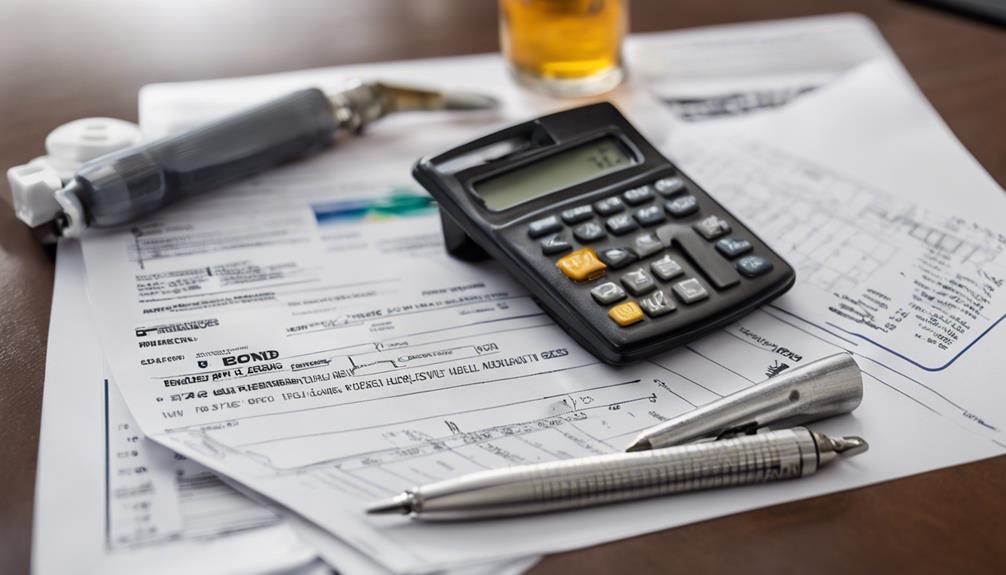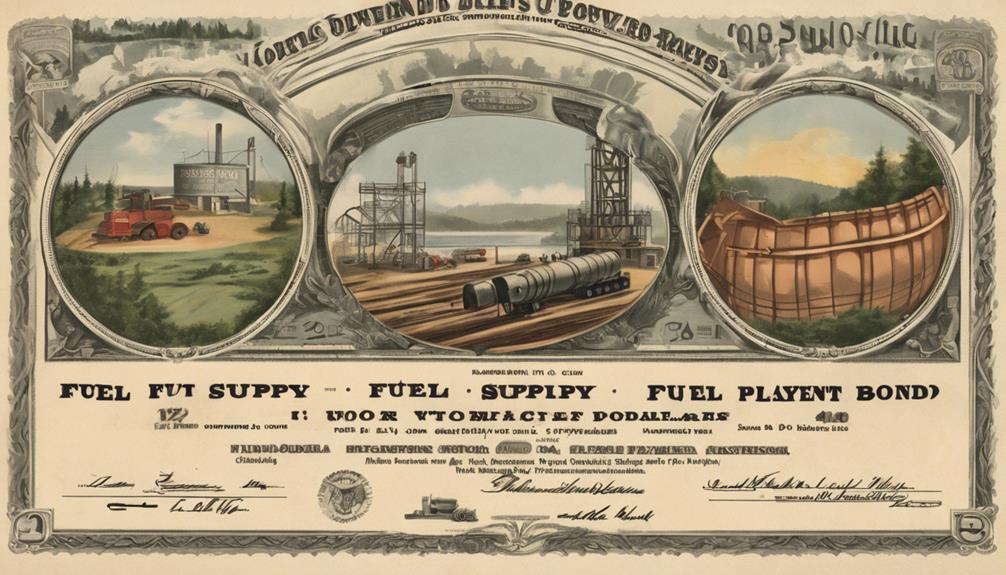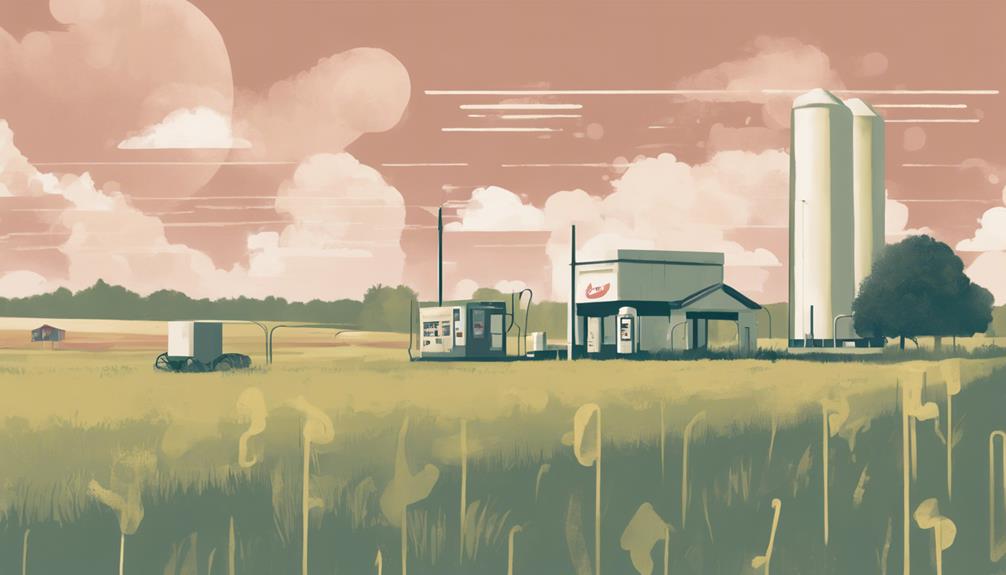If you're involved in fuel-related projects in Wisconsin, understanding the Fuel Supply Payment Bond is crucial. This bond not only ensures that fuel suppliers get paid on time but also strengthens your project's credibility. It's mandatory for public works, which means it plays a significant role in compliance with state regulations. However, misconceptions about the bond can lead to confusion and potential pitfalls. What do you really need to know about its application process and eligibility criteria? The answers might surprise you.
Definition of Fuel Supply Payment Bond

A Fuel Supply Payment Bond serves as a financial guarantee that ensures suppliers get paid for the fuel they provide to contractors or project owners. This bond acts as a safety net for suppliers, minimizing the risk of non-payment when they deliver essential fuel resources. Essentially, it assures that if the contractor fails to meet their payment obligations, the bond will cover the amount owed to the suppliers.
When you engage in projects that require fuel, obtaining this bond becomes crucial. It not only establishes trust between suppliers and contractors but also demonstrates your commitment to fulfilling financial responsibilities.
The bond involves three parties: the principal (the contractor), the obligee (the project owner), and the surety (the bond issuer). The surety guarantees payment to the suppliers if the principal defaults.
Having a Fuel Supply Payment Bond can enhance your project's credibility, making it easier to secure contracts. It signifies to suppliers that you're serious about honoring your financial commitments.
Importance of the Bond
Understanding the importance of a Fuel Supply Payment Bond is crucial for any contractor involved in fuel-dependent projects. This bond acts as a safety net, ensuring that suppliers and subcontractors get paid for the fuel they provide, which is essential for maintaining a stable supply chain. Without it, you risk financial instability, as unpaid suppliers can halt your project, leading to costly delays.
Additionally, fuel tax bonds provide financial guarantees that can enhance your credibility. Clients often view bonded contractors as more reliable and professional, which can give you a competitive edge in securing contracts. It demonstrates your commitment to fulfilling financial obligations, fostering trust among all parties involved.
Moreover, the bond protects you from potential legal issues. If a supplier claims they haven't been paid, the bond provides a mechanism for them to recover their money, shielding you from direct liability. This not only protects your reputation but also ensures that your cash flow remains steady.
In short, the Fuel Supply Payment Bond is vital for maintaining smooth operations, building trust, and safeguarding your business's financial health. It's not just a requirement; it's a strategic asset that can facilitate your success in fuel-dependent projects.
How the Bond Works

Knowing how the Fuel Supply Payment Bond functions is key for contractors navigating fuel-related projects. This bond serves as a financial guarantee that you'll pay your fuel suppliers on time.
When you secure this bond, a surety company backs it, ensuring that if you fail to meet your payment obligations, the supplier can file a claim against the bond.
In practical terms, you'll need to apply for the bond, providing necessary documentation such as your credit history and business information. Once approved, you'll pay a premium, typically a percentage of the bond amount, which is based on your creditworthiness.
If you do default on payments, the fuel supplier can claim the bond amount to cover their losses. You're then responsible for reimbursing the surety company.
This mechanism protects suppliers, ensuring they receive compensation even if you can't pay.
Eligibility Criteria for Suppliers
To qualify as a supplier under the Wisconsin Fuel Supply Payment Bond, you must meet specific criteria that demonstrate your reliability and financial stability.
First, you need to have a valid business license and be in good standing with state regulations. This means you've complied with all local and state laws governing your operations.
Next, you'll need to show proof of financial stability. This often involves providing financial statements that reflect your company's overall health and ability to meet its obligations. Lenders and bonding companies typically look for consistent revenues and a solid credit history.
Additionally, experience in the fuel supply industry is crucial. You'll want to highlight your track record of successful transactions and satisfied customers. This experience reassures stakeholders that you can handle the responsibilities that come with the bond.
Lastly, obtaining references or testimonials from past clients can bolster your application. These endorsements provide evidence of your reliability and professionalism.
Meeting these eligibility criteria will position you favorably as a supplier under the Wisconsin Fuel Supply Payment Bond, ensuring you can participate effectively in the marketplace.
Application Process for the Bond

Once you've met the eligibility criteria as a supplier, the next step is the application process for the Wisconsin Fuel Supply Payment Bond.
Start by gathering the necessary documentation, which typically includes proof of your business's financial stability and operational history. This may involve providing tax returns, financial statements, and any relevant contracts.
It's also important to ensure you're aware of the specific Michigan Surety Bonds that may relate to your operations, as regulations can differ by state.
Next, you'll want to find a surety company or a bonding agent that specializes in fuel supply bonds. It's crucial to choose a reputable provider, as they'll guide you through the process and help you understand the specific requirements.
Reach out to them to request an application form.
Once you've completed the application, submit it along with the required documents. The surety will evaluate your financial standing and business practices. They may also require additional information or clarifications before approving your bond.
After approval, you'll receive a premium quote. If you agree to the terms, you'll pay the premium, and the bond will be issued.
Keep a copy of the bond handy, as it may be required for your business operations. With this, you're now ready to proceed with your fuel supply endeavors confidently.
Benefits for Contractors
The Wisconsin Fuel Supply Payment Bond offers several advantages for contractors engaged in fuel supply operations. First and foremost, this bond helps ensure you receive timely payments for the fuel you deliver. By having this bond in place, you can build trust with your clients, showing them you're committed to meeting your obligations.
Additionally, the bond plays a crucial role in enhancing your credibility and trustworthiness, similar to the way Florida Surety Bonds do for businesses operating in the state.
Moreover, the bond serves as a safety net. If a client fails to pay, you can file a claim against the bond, helping to mitigate financial losses. This security can make it easier for you to focus on your operations without the constant worry of unpaid invoices.
Furthermore, possessing this bond can enhance your reputation in the industry. Clients often prefer working with contractors who've bonds, as it demonstrates professionalism and reliability. It can also give you a competitive edge when bidding for contracts, as many projects require proof of bonding.
Lastly, the bond can help streamline your business processes. With a bond in place, you may find it easier to access credit and financing, leading to improved cash flow and operational efficiency. Overall, the benefits of obtaining a Wisconsin Fuel Supply Payment Bond are significant for your contracting business.
Common Misconceptions About the Bond

Many contractors hold misconceptions about the Wisconsin Fuel Supply Payment Bond that can lead to confusion and hesitation. One common myth is that the bond is only necessary for large projects. In reality, any contractor involved in fuel supply for public works must secure this bond, regardless of project size.
Additionally, similar bonds, such as Texas Surety Bonds, are required for various contractor activities, highlighting the importance of understanding bonding requirements.
Another misconception is that obtaining the bond is overly complex and time-consuming. While it may seem daunting, the process is straightforward, especially when you work with a reliable surety company. They'll guide you through the necessary documentation and requirements.
Some contractors also believe that the bond guarantees payment from the surety. However, it's important to remember that the bond acts as a safeguard for suppliers and subcontractors, ensuring they get paid if you fail to meet your obligations.
Lastly, many think the bond is an unnecessary expense. On the contrary, it can enhance your credibility and allow you to win more contracts, ultimately saving you money in the long run.
Conclusion
In summary, the Fuel Supply Payment Bond is crucial for anyone involved in fuel-related projects in Wisconsin. It not only ensures timely payments to suppliers but also strengthens your credibility as a contractor. By understanding its importance and the application process, you can protect your business and foster trust within the industry. Don't let misconceptions hold you back; embracing this bond can lead to greater financial stability and smoother project execution.


